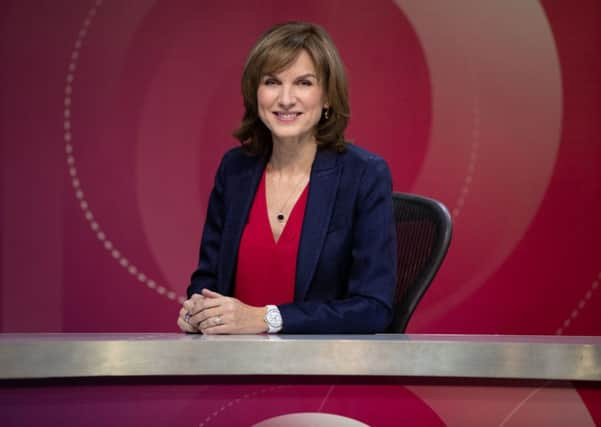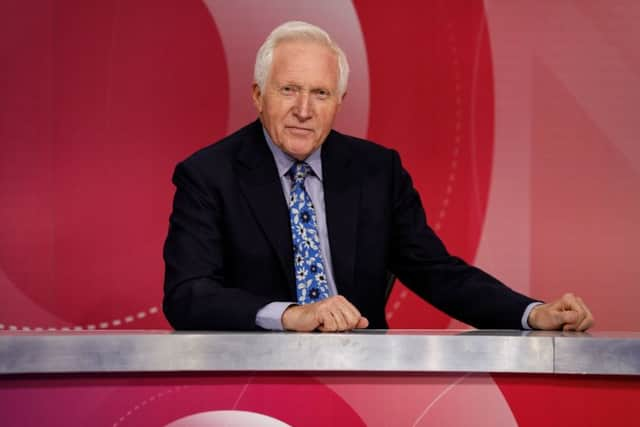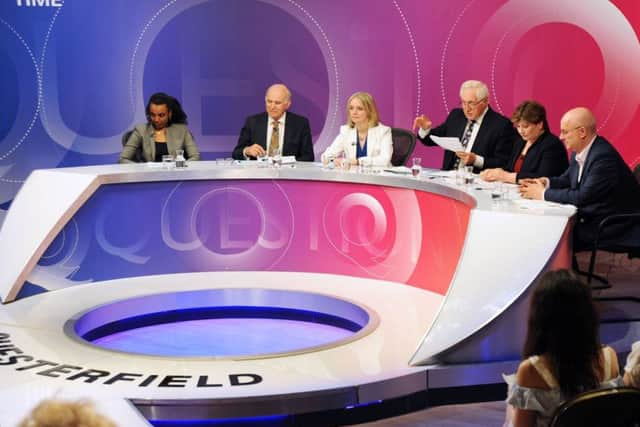David Blunkett: Time for questions and answers about TV coverage of politics as Fiona Bruce begins new era


Instead, in this brand new year, I want to reflect on the way in which politics and political issues are dealt with by the BBC and how our current affairs programmes are serving the public.
Advertisement
Hide AdAdvertisement
Hide AdA New Year, a new host of what the BBC describe as their ‘‘flagship’’ political programme – BBC1’s Question Time.


Exit, after almost quarter of a century, David Dimbleby. Step forward, Fiona Bruce, who made a good start. But the format is maintained. There lies a problem.
Way back in 1982, yes it was that far back, when I first appeared on Question Time, it really was both lively viewing and informative and, therefore, an educative process. As much for those of us who took part as those watching.
There were four participants other than Sir Robin Day, David Dimbleby’s predecessor. Robin Day was not only extremely well-informed and a political interviewer of renown, but also a bit of a patrician.
Advertisement
Hide AdAdvertisement
Hide AdI only got on the programme because the producer managed to persuade him that, as the then leader of a major city and someone prepared to speak their mind, I might balance out the London-centric, Southern-centric panellists who dominated the programme.


I wasn’t entirely sure that he was happy with this as he hobnobbed with Cabinet ministers and here was this jumped up Sheffield city councillor who thought he was very smart.
But the programme itself was genuinely informative: with four people trying to address the issues and with an audience that were engaged but not incessantly intruding on the debate.
This made it possible to actually spend time addressing the issues and doing so in a way which was both respectful and challenging. In other words, the very opposite of the kind of political so-called ‘‘dialogue’’ that we have today.
Advertisement
Hide AdAdvertisement
Hide AdBear in mind this was during Margaret Thatcher’s first term in office and therefore it wasn’t short on controversy or edginess. We had both the time and inclination to try and get to grips with the momentous events around us.
On that occasion, my main Conservative opponent was a certain Kenneth Clarke. This was his first appearance as well as mine. I think I enjoyed the experience more than he did.
As a junior health minister, he was really under the cosh whereas I could pretty much get away with anything – this included the first and only time I’ve used my guide dog as a prop, declaring, on one boring question, that he had ‘‘gone to sleep’’.
But the reason I’m addressing the emergence of a new compere for the programme is simple. If we are to continue to engage the interest of the public at a time when they’re sick and tired of… (I won’t mention that word) and want politicians to relate to the day-to-day concerns of the public, Question Time needs refreshing.
Advertisement
Hide AdAdvertisement
Hide AdGo back to four panellists, engage the audience but in a thought-through manner rather than bringing in individuals (or personalities) willy-nilly, and try and identify where people agree with each other and not just where they disagree.
Perhaps the programme could be broken down into two parts. One where two or three questions are addressed in detail and the second half where the audience pick one question of those chosen in advance and then challenge the panellists in a meaningful way, and with the ability to follow up on the original question.
My current criticism is not sour grapes. I was invited on to Question Time twice in the autumn and I would have been happy to participate, not least in the final weeks of David Dimbleby’s sojourn in the chair – as I like him – but family commitments made it impossible. I wasn’t going to abandon plans I’d signed up to in order to go to King’s Lynn or some other far-flung place. Those days have long gone!
My concern, however, is much wider than just the format of the programme. I think that the traditional terrestrial broadcasters need to be challenged on current affairs coverage, the nature of what is on offer and the engagement, or lack of it, of those who live and work outside of London.
Advertisement
Hide AdAdvertisement
Hide AdIt isn’t as so many people seem to think that the wider public are not interested in politics. My experience is that they certainly are. Nor is it that social media has triumphed over traditional interest in or engagement with broadcasting.
Rather, the pedestrian nature of what’s on offer: tired formats, repetition followed by repetition, news broadcasts that bring very little new information over a 24-hour news cycle.
In other words, a lack of creativity, imagination and even the old-fashioned ability to see a story rather than simply going for the easy option of the same old faces and voices addressing the exact same issue that was discussed and debated 18 hours previously.
If ever we needed an approach that engaged the audience in thoughtful and intelligent ways, it has to be now. Our politics is a mess, public discourse is a mess and the damage we’re doing to our democracy is incalculable. That is why flagship programmes like Question Time really do matter to the country.
Good luck Fiona Bruce, you’ll need it.
David Blunkett is a Labour peer. The former Sheffield Brightside and Hillsborough MP held three Cabinet posts in Tony Blair’s government.